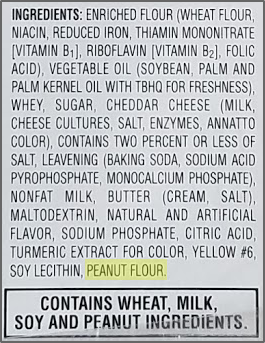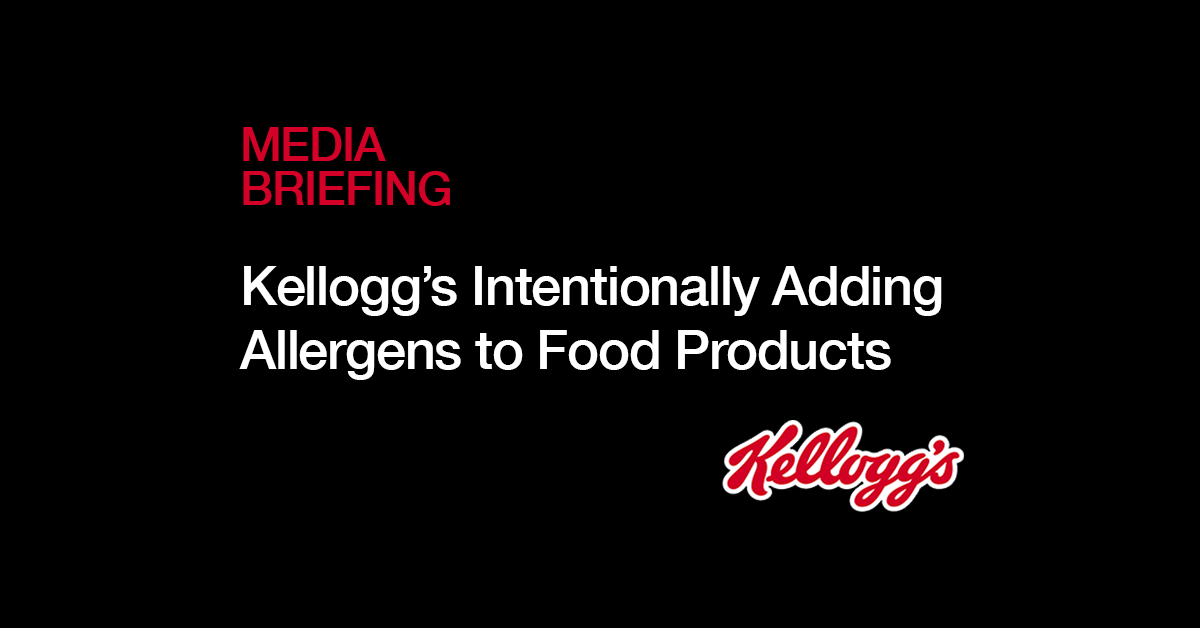UPDATE: Please note that on May 17, 2016, Kellogg’s finally admitted to KPIX TV San Francisco that the reason they added peanut flour to eight varieties of Keebler and Austin crackers was because they were manufactured on shared lines with peanuts. This allowed them to add peanuts to the ingredient list as stated in this article. To see the newscast with Kellogg’s admission, see our update entitled Kellogg’s, Unintended Consequences, and the Death of ‘May Contain’.
On March 30, 2016, the Kellogg Company quietly disclosed on a food allergy website that they would begin adding peanut flour to eight varieties of crackers that were previously considered safe by many with peanut allergy1. The decision and relative silence surrounding the disclosure puts many with peanut allergies – especially children – at significant risk for anaphylaxis, a severe, sometimes life threatening reaction.
Though Kellogg’s will not disclose their reason for adding peanut flour to products and endangering individuals with peanut allergy – asserting only that the change was “needed” and that is was a “hard decision” for them2 – we surmise the company is doing this to avoid the costs of complying with new directives of the Food Safety Modernization Act (FSMA) that become mandatory this September3.
This briefing is intended to provide context for the media, parents, school nurses, teachers, and all others that care for children with food allergies so they fully appreciate the implications of Kellogg’s decision.
What is the immediate concern?
Many in the food allergy community have considered these crackers safe for peanut allergies for years. They are often considered “go to” snacks at daycare facilities, preschools, and cafeterias where peanut and tree nut bans are in place to protect allergic students.
An individual with peanut allergy that ingests or comes in contact with the newly formulated crackers runs the risk of an anaphylactic reaction that may result in hospitalization or death.
We urge you to note this change and avoid these Keebler and Austin brand products if you or someone in your care has a peanut allergy. Note that these products are no longer safe for facilities that maintain a peanut-exclusion policy.
Which products are affected?
The firm’s Keebler and Austin brand crackers will be affected, specifically4:
- Keebler® brand Club® & Cheddar Sandwich Crackers, Cheese & Cheddar Sandwich Crackers, Pepper Jack Sandwich Crackers and Variety Pack Sandwich Crackers;
- Austin® brand Cheddar Cheese Cracker Sandwiches, Grilled Cheese Cracker Sandwiches, Pepper Jack Cracker Sandwiches, and Variety Pack Cracker Sandwiches.
Why is Kellogg’s adding peanuts to products previously considered safe?
FSMA directives will soon raise allergen cross-contact – i.e. contamination resulting from manufacturing practices – to the level of scrutiny of other food-borne safety issues where there were fewer mandatory rules before5. This may introduce a nominal cost for companies to comply.
 It is surmised that Kellogg’s is preemptively adding minute quantities of peanut flour to these crackers so the ingredient can be added to the ingredient list. This will allow the company to avoid the costs of complying with directives of the Food Safety Modernization Act (FSMA) that go into effect this September.
It is surmised that Kellogg’s is preemptively adding minute quantities of peanut flour to these crackers so the ingredient can be added to the ingredient list. This will allow the company to avoid the costs of complying with directives of the Food Safety Modernization Act (FSMA) that go into effect this September.
Rather than implement the additional requirements of the new FSMA directives, it is believed Kellogg’s is adding trace amounts of the allergen to dispense with the entire process. If this is indeed true, they are making their products more allergenic in order to avoid the costs of complying with directives intended to make product safer.
Hasn’t the company responded to concerns by promising to return one variety of cracker to the peanut-free formulation?
Yes, but their confusing pledge to remove the peanut flour from the Austin Grilled Cheese Sandwich Crackers variety in September after adding it now greatly exacerbates the dangers6. This means consumers may purchase a product that either does or does not contain peanut flour depending on when they visit the market.
The company makes no claim the reformulated crackers will be made in a peanut-free facility, nor are there assurances that once the peanut flour is removed, the crackers will be produced on a manufacturing line separate from the peanut flour containing varieties. There may still be a danger of cross-contact with peanuts even after the peanut flour has been removed.
We urge those with peanut allergy to avoid Austin Grilled Cheese Sandwich Crackers regardless of whether or not the peanut flour has been removed.
How might this lead to other allergens being added across Kellogg’s product line?
If indeed Kellogg’s is taking this action to avoid the costs of implementing FSMA directives for peanut allergen control in their Keebler manufacturing facilities, they may be planning to add traces of other allergens – including milk, soy, egg and tree nuts – to other products manufactured in facilities where these allergens are processed in order achieve the same results.
How might this lead to other companies adding allergens to their product lines?
Kellogg’s action is a litmus test for the entire food industry. If Kellogg’s is successful implementing their plan with minimal pushback from consumers, other companies may follow their lead by adding minute quantities of allergens to their products in order to achieve the same cost avoidance goals.
We have reached a tipping point where the industry may decide that adding allergens to products in order to avoid the costs of implementing FSMA directives is in the interest of their shareholders. This will have catastrophic consequences for the allergic community, where many products that were previously acceptable for consumption are purposefully tainted.
How are concerned consumers responding?
A petition was initiated on Change.org urging John A Bryant, Chairman and CEO of the Kellogg Company to reconsider his plan. To date, the petition has garnered over 24,000 signatures and continues to build momentum.
Consumers are also tweeting, e-mailing, posting and voicing their concerns via Kellogg’s website, social media properties and consumer phone line.
Important Consumer Resources
There are a number of resources available to learn more about Kellogg’s plan and take action:
- Read more about Kellogg’s plan: snacksafely.com/kelloggs
- Read, sign, and distribute the petition to family and friends: change.org/KelloggsPeanuts
- Tweet your concerns to @KelloggsUS using hashtag #NoPeanutFlour
- Post your concerns to Kellogg’s website: kelloggs.com/en_US/contact-us-form.html
- Voice your concerns to Kellogg’s consumer phone line: 1-800-962-1413
References
- 1Food Allergy Research & Education – foodallergy.org/alerts/ingredient-notices-feed;
- 2SnackSafely.com – snacksafely.com/2016/04/kelloggs-potential-for-injury-illness-and-death-is-a-cost-of-doing-business/;
- 3US Food and Drug Administration – fda.gov/Food/GuidanceRegulation/FSMA/ucm334115.htm;
- 4Food Allergy Research & Education – ibid;
- 5US Food and Drug Administration – ibid;
- 6SnackSafely.com – ibid;
Author and Copyright
 This document was produced by SnackSafely.com which is solely responsible for its content.
This document was produced by SnackSafely.com which is solely responsible for its content.
© 2016, SnackSafely.com – All rights reserved. May be reproduced and redistributed in its entirety if unedited and inclusive of this copyright notice.






I think there are more friendly flours to use instead of peanut flour. Anything but peanuts for kids snacks….I’m not allergic to peanuts.
I never write to companies with complaints but am so disgusted by this that I just did! Thank you for the info on what to do Sancksafely! Look forward to follow up!
My family will NEVER buy ANYTHING made by KELLOGG’s again.
I agree with sidney… Goodbye!!!
You cannot fathom the loss of customers. Foolish!!!
Terrible, just terrible and foolish. Sad to hear. NO ON KELLOGG, I will be sure to pass this on and around all my peoples.
Kellogg you are making a huge mistake. so many children are allergic to peanuts. Who ever made this decision obviously has not had to give a child an epi pen. Or seen anaphylaxis !!!!!
What about all the hidden crap Kellogs is putting in its cereal. I had a bowl of raisin bran 4 days in a row for breakfast, then some hives emerged, 2 weeks later i still had new hives emerging, and i was covered in hives from my head to my toes. This was the first time i had eaten raisin bran in about 8 years, had never had a reaction to it prior. I am not allergic to dairy, nuts, bran or raisins! so what else are they putting in the cereal?
I think this is actually good news! I’ve always assumed those cracker sandwiches weren’t safe since they also make a peanut butter variety. Personally, I think manufacturers should have freedom to manufacture foods the way they want. I wish all cross-contamination were listed, but if it can’t be, I’m thrilled to have it right there in black and white as an ingredient so we know for sure to avoid it. I applaud Kellogg’s!